Moudle11 Photos 词汇短语句型精讲 课件(62张PPT)
文档属性
| 名称 | Moudle11 Photos 词汇短语句型精讲 课件(62张PPT) |
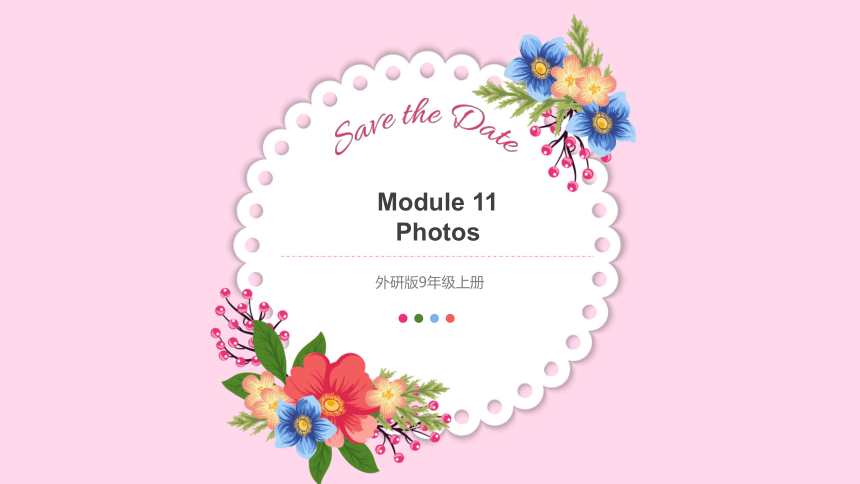
|
|
| 格式 | pptx | ||
| 文件大小 | 13.2MB | ||
| 资源类型 | 教案 | ||
| 版本资源 | 外研版 | ||
| 科目 | 英语 | ||
| 更新时间 | 2021-07-21 00:00:00 | ||
图片预览

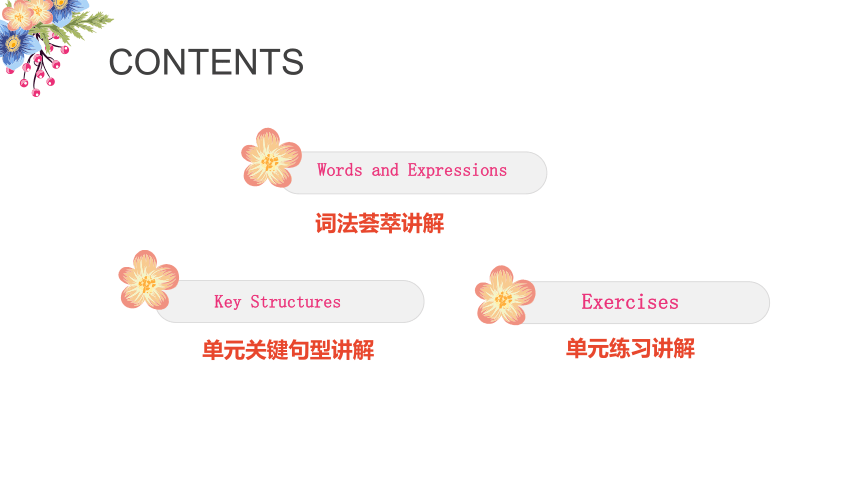
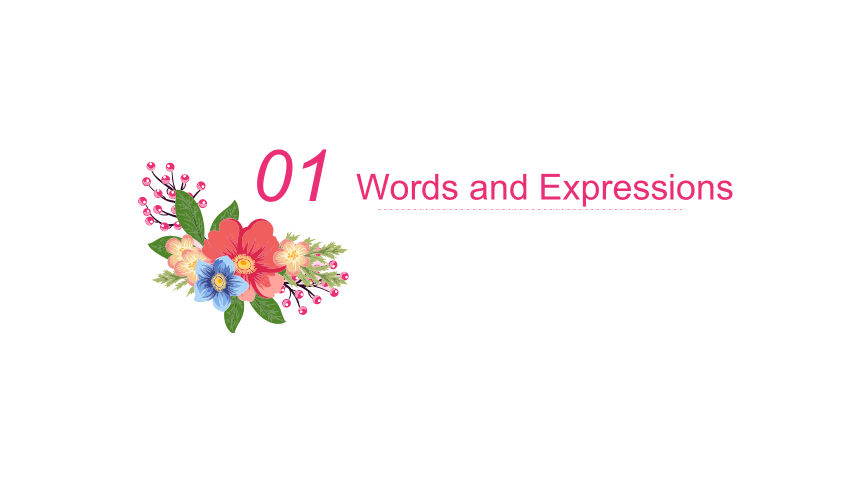
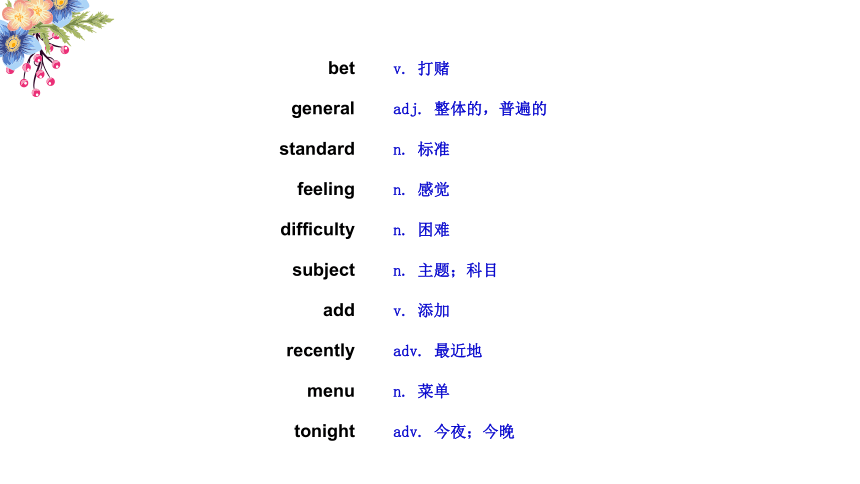
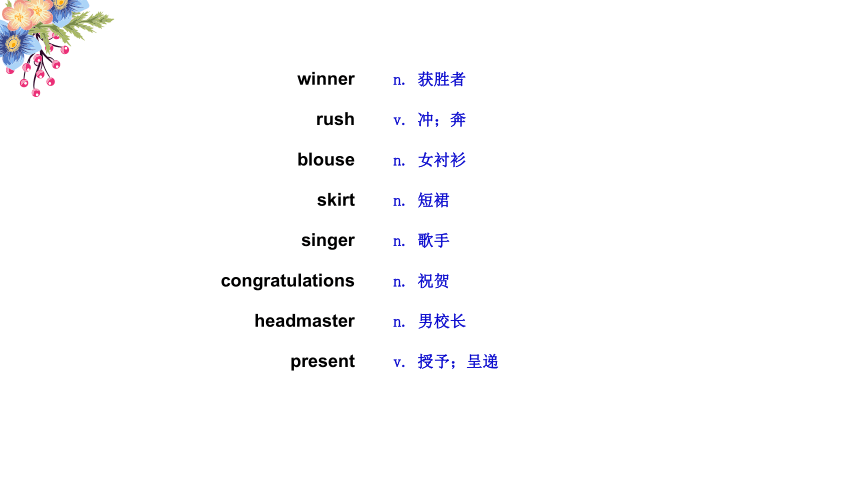
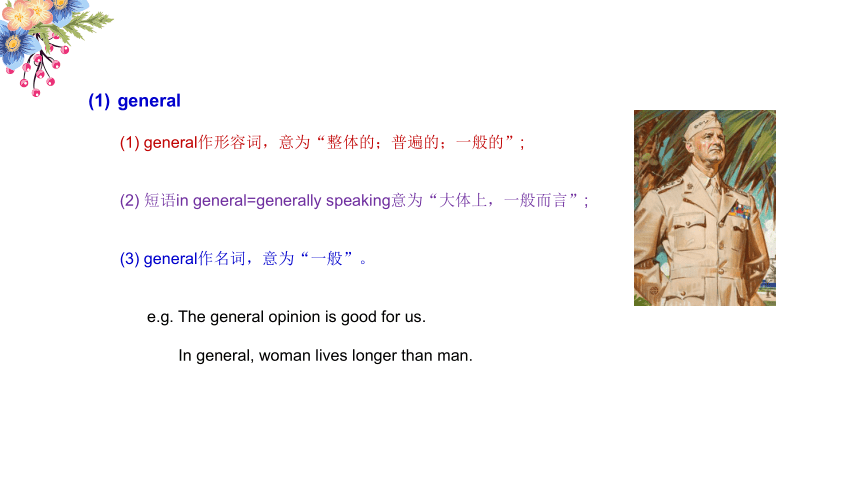
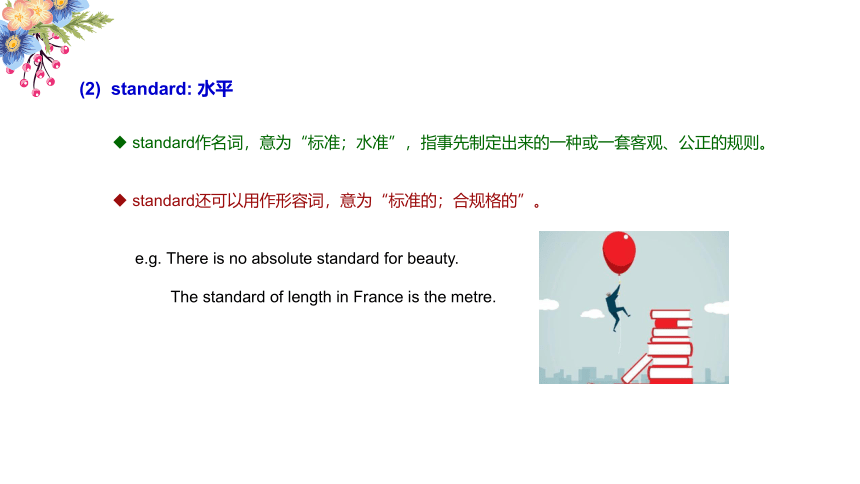
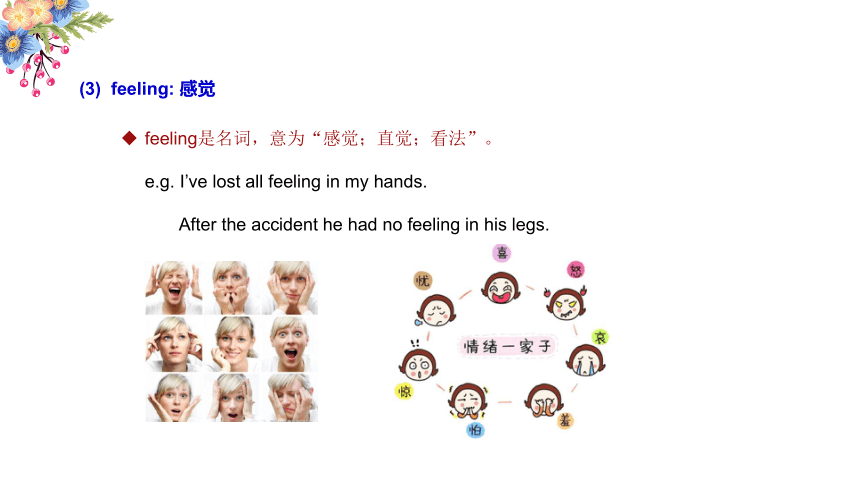
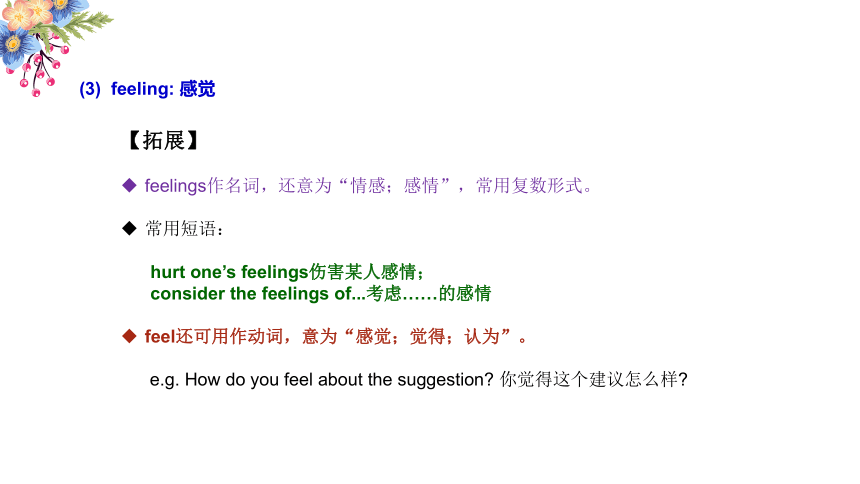
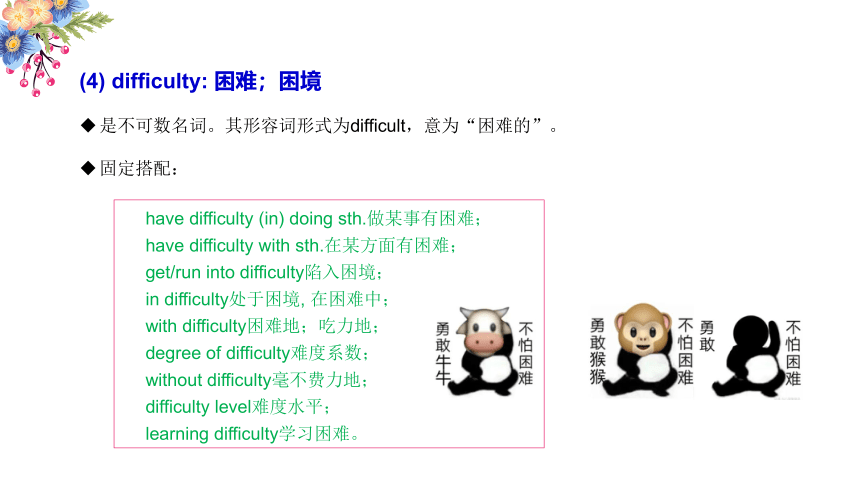
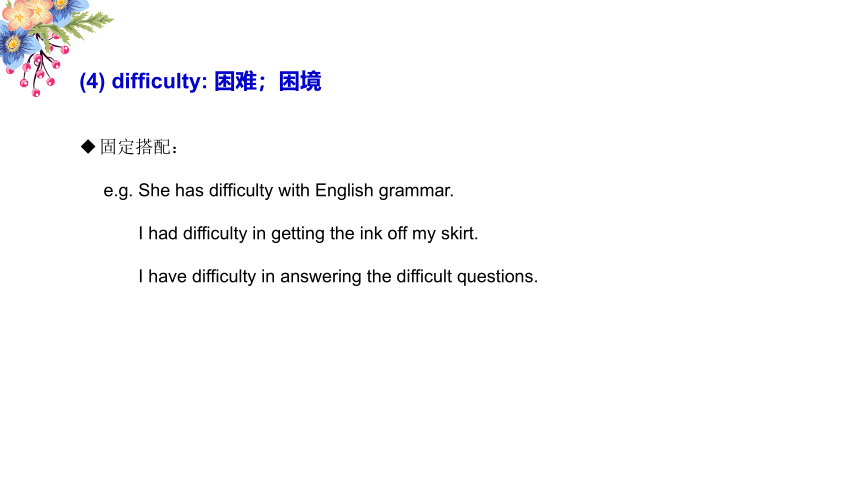
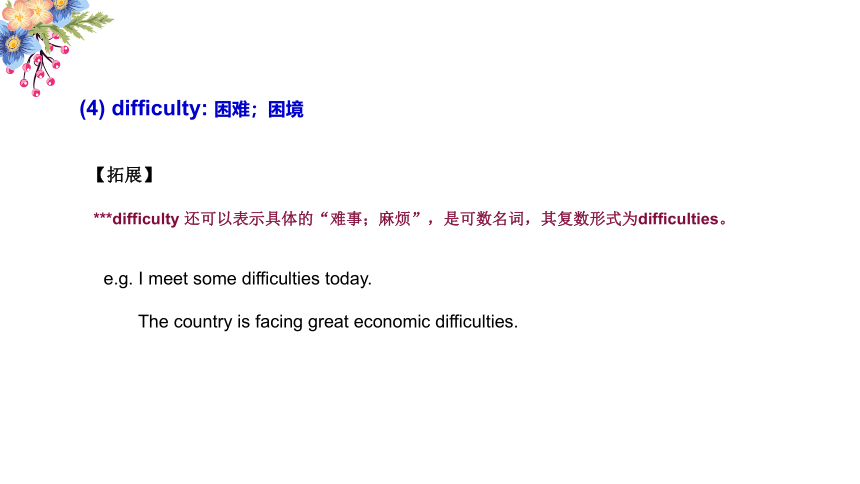
文档简介
Module 11
Photos
外研版9年级上册
词法荟萃讲解
Words and Expressions
单元关键句型讲解
Key Structures
CONTENTS
Exercises
单元练习讲解
01
Words and Expressions
bet
general
standard
feeling
difficulty
subject
add
recently
menu
tonight
v. 打赌
adj. 整体的,普遍的
n. 标准
n. 感觉
n. 困难
n. 主题;科目
v. 添加
adv. 最近地
n. 菜单
adv. 今夜;今晚
winner
rush
blouse
skirt
singer
congratulations
headmaster
present
n. 获胜者
v. 冲;奔
n. 女衬衫
n. 短裙
n. 歌手
n. 祝贺
n. 男校长
v. 授予;呈递
general
(1) general作形容词,意为“整体的;普遍的;一般的”;
(2) 短语in general=generally speaking意为“大体上,一般而言”;
(3) general作名词,意为“一般”。
e.g. The general opinion is good for us.
In general, woman lives longer than man.
(2) standard: 水平
standard作名词,意为“标准;水准”,指事先制定出来的一种或一套客观、公正的规则。
standard还可以用作形容词,意为“标准的;合规格的”。
e.g. There is no absolute standard for beauty.
The standard of length in France is the metre.
(3) feeling: 感觉
feeling是名词,意为“感觉;直觉;看法”。
e.g. I’ve lost all feeling in my hands.
After the accident he had no feeling in his legs.
(3) feeling: 感觉
【拓展】
feelings作名词,还意为“情感;感情”,常用复数形式。
常用短语:
hurt one’s feelings伤害某人感情;
consider the feelings of...考虑……的感情
feel还可用作动词,意为“感觉;觉得;认为”。
e.g. How do you feel about the suggestion? 你觉得这个建议怎么样?
(4) difficulty: 困难;困境
是不可数名词。其形容词形式为difficult,意为“困难的”。
固定搭配:
have difficulty (in) doing sth.做某事有困难;
have difficulty with sth.在某方面有困难;
get/run into difficulty陷入困境;
in difficulty处于困境, 在困难中;
with difficulty困难地;吃力地;
degree of difficulty难度系数;
without difficulty毫不费力地;
difficulty level难度水平;
learning difficulty学习困难。
(4) difficulty: 困难;困境
固定搭配:
e.g. She has difficulty with English grammar.
I had difficulty in getting the ink off my skirt.
I have difficulty in answering the difficult questions.
(4) difficulty: 困难;困境
【拓展】
***difficulty 还可以表示具体的“难事;麻烦”,是可数名词,其复数形式为difficulties。
e.g. I meet some difficulties today.
The country is facing great economic difficulties.
(5 ) subject: “主题;话题;科目”
subject 着重指文章、书籍、画或谈话等所涉及对象的题目或主题。
e.g. What is the subject of the poem?
This is a book on the subject of love.
(6) add
add作及物动词,意为“增加,添加”,宾语可以是数字,也可以是有形的东西,如糖、水等,还可以是无形的东西,如麻烦等。
① add sth. to sth.意为“把某物加到某物上”。
e.g. Please add some hot water to the tea.
② add to意为“增加;增添”,其宾语多为困难、欢乐等抽象名词。
e.g. Her coat adds to her beaty.
(6) add
add作及物动词,意为“增加,添加”,宾语可以是数字,也可以是有形的东西,如糖、水等,还可以是无形的东西,如麻烦等。
③ add up意为“把……加起来”。
e.g. He is adding up the bills now.
④ add up to意为“总计为;总共是;合计达”,后面多跟合计起来的数目。
e.g. The bills add up to 1,000 yuan.
(7) tonight
tonight作副词,意为“(在)今晚;(在)今夜”,可用作副词,在句中作状语,常用于句末,有时也用于句首。
e.g. We are having fish for dinner tonight.
【拓展】tonight还可用作不可数名词,意为“今晚;今夜”。其前面不加冠词,可用所有格形式作定语。
e.g. tonight’s news/weather report今晚的新闻/天气预报
(8) congratulations
congratulation通常用作复数,是祝贺用语。
可单独使用,也可用congratulations to sb. on sth. 表示因何事、向谁祝贺。回答祝贺一般用thank you等表示感谢的话。
其动词形式为congratulate,意为“祝贺”。
e.g. Congratulations to you on winning the first prize.
---- I have just passed my driving test. ---- Congratulations!
---- Congratulations to you on your good result. ---- Thank you!
(8) congratulations
【拓展】
口语对话中省略后面的to you,直接用congratulations向对方表达祝贺。
与congratulations有关的常用搭配:
congratulations on sth.为某事祝贺;
congratulate sb.on sth.为某事向某人祝贺。
e.g. Congratulate you on your success!
Congratulations to you on your good results.
(9) present
present动词,意为“授予;呈递”。
present sth. to sb.=present sb. with sth.意为“把……授予/赠送给某人;授予某人某物;颁发/赠送给某人某物”。
e.g. The ships present a beautiful sight.
Who will present us with the prizes? = Who will present the prizes to us?
(9) present
【拓展】
present用作名词,表示“礼物”,用作形容词意为“出席的;目前的”。
词组at present表示“目前;现在”。
e.g. I don’t need the book at present.
We chose a Christmas?present?for her.
It’s a few days before his birthday. At present, he hasn’t received any present.
you bet
the thing is
be in with a chance
read out
compared with
even though
protect sth. against sth.
的确;当然;一定
答案是;问题是
有可能;有机会
朗读;宣读
(与…)相比
即使;尽管
保护…; 使…不受
on he right
in the centre
at the back
enter the photo competition
at the school dance
take photos of
the general standard
much higher
have a feeling
在右边
居中;在中间
在后面
参加摄影竞赛
在学校舞会
给……拍照
整体水准
更高
有一种感觉
solve these little difficulties
choose the subject
fly kites
read a menu
for the first time
more than
be pleased with
compared with
be sorry to do sth.
解决这些小困难
选择主题
放风筝
看菜单; 阅读菜单
初次; 首次
很;非常
对……满意
与……相比;
因做某事而感到遗憾/内疚/抱歉;
give prize to sb.
take a photo of
on a windy evening
manage to do sth.
a group of
some memories of
congratulations to sb.
thanks to
welcome sb. to
给某人颁奖;
拍……照片;
一个有风的夜晚;
设法做某事;
一群/组……;
对……的记忆/回忆;
祝贺某人;
感谢;多亏;幸亏;
欢迎某人去……;
present the prize to sb.
by the way
a couple of
think of
try out
far from
by the end of
be used to doing sth.
给某人颁奖
顺便说一下;顺便问一下
两个人;两件事物;几个人;几件事物
考虑
试用
远离
到……末/为止
习惯于做某事
you bet
you bet意为“的确;当然;一定”,是一句日常交际用语,相当于sure, certainly或of course,表示同意前面所说的内容。
you bet即You can bet money on that.“你可以把钱下注在那上面”,言下之意,
就是说这件事百分之百正确。是一种非常流行的表达方式,在美国甚至比yes用
得更频繁。
bet动词,过去式过去分词仍为bet,意为“打赌;下赌注”。
e.g. ---- Could you keep it a secret for me? ---- You bet.
---- Will you go to Shanghai with me? ---- You bet!
the thing is: “答案是;问题是;事情是;重要的是”
the thing is意为“答案是;问题是;事情是;重要的是”等,用作插入语,用来解释或者阐述一件事情。
e.g. The thing is, he doesn’t like swimming.
The thing is, I have plans on Saturday night.
the thing is: “答案是;问题是;事情是;重要的是”
【拓展】英语中类似的说法还有:
the trouble is麻烦是;
the truth is事实是;
the point is关键是,等。
be in with a chance “有可能;有机会”
chance用作可数名词,意为“机会,可能性”。
常用短语:
be in with a chance to do sth.=be in with a chance of doing sth.:“有可能/机会做某事”。
e.g. I think I’m in with a chance of getting the job.
I think we’re in with a good chance of beating them.
be in with a chance “有可能;有机会”
【拓展】
与chance有关的常用搭配:
give sb. a chance给某人一个机会;
have a chance to do sth.有做某事的机会;
have no chance to do sth.没有做某事的机会;
by chance偶然地;意外地;
take a chance冒险;
take one’s chance碰运气。
compared with…
compared with/to...意为“和……相比”,该短语通常要求与其他词语组成独立状语,
放在句首。
e.g. Compared with/to other cities, I think Guilin is more beautiful.
Compared with/to last year, we have had more success this year.
even though
even though连词词组,意为“即使;尽管”,引导让步状语从句;
引导的从句内容往往是真实的,主要用于引出不利用于主句情况的信息,这里的even是副词,用来加强语气。
even though/even if/都可引导让步状语从句,都不能与but连用,但可以与yet,still等连用。
even though可与even if/though/although互换。但是语气比though/although强烈。
e.g. Even though it rains, he will come on time.
He will not tell the secret even though he knows it.
表示防御较为严重的伤害时,通常用介词against,一般情况常用from,但区分不是很严格。
其名词形式为protection意为“保护,防卫”。
e.g. Protect children against violence.?
Raincoats can protect us from/against the rain.
protect...against/from...“保护……;使……不受”
【拓展】
prevent/stop/keep...from doing...“阻止……做……或阻止某事的发生”,
protect...from/against...表示“保护……免受……”。
e.g. We must stop the factories from polluting the air so that we can be protected against the smog.
protect...against/from...“保护……;使……不受”
02
Key structures
And the general standard of the competition is much higher this year. 而且今年摄影比赛的整体标准高了很多。
general standard意为“整体标准”。
general作形容词,意为“整体的;普遍的;一般的”,短语in general=generally speaking意为“大体上,一般而言”,
general作名词,意为“一般”。
e.g. The general opinion is good for us.
In general, woman lives longer than man.
And the general standard of the competition is much higher this year. 而且今年摄影比赛的整体标准高了很多。
standard作名词,意为“标准;水准”,指事先制定出来的一种或一套客观、公正的规则。
standard还可以用作形容词,意为“标准的;合规格的”。
e.g. There is no absolute standard for beauty.
The standard of length in France is the metre.
I have a feeling that we can solve these little difficulties. 我感觉我们能解决这些小问题。
feeling是名词,意为“感觉;直觉;看法”。
e.g. I’ve lost all feeling in my hands.
After the accident he had no feeling in his legs.
The peasant child has a natural feeling for music.
I have a feeling that we can solve these little difficulties. 我感觉我们能解决这些小问题。
【拓展】
feelings作名词,还意为“情感;感情”,常用复数形式。
常用短语:
(1) hurt one’s feelings伤害某人感情;
(2) consider the feelings of...考虑……的感情;
feel还可用作动词,意为“感觉;觉得;认为”。
e.g. How do you feel about the suggestion? 你觉得这个建议怎么样?
Why don’t you choose the subject Home and Away, and take photos of Beijing? 你为什么不选择“故乡与他乡”这个主题,拍一些北京的照片?
Why don’t you/we+动词原形?=Why not+动词原形? 意为“为什么不做……呢?”。
是一个提建议、征求意见或表示疑问的句型,其后跟动词原形。
e.g. Why don’t you buy a pair of shoes? They are cheap.
Why don’t you take a walk after supper? =Why not take a walk after supper?
Take some photos of Beijing and add some photos of Cambridge that you took recently. 你可以拍一些北京的照片,再加上一些最近拍的剑桥的照片。
① add sth. to sth.意为“把某物加到某物上”。
e.g. Please add some hot water to the tea.
May I add some sugar to the milk?
② add to意为“增加;增添”,其宾语多为困难、欢乐等抽象名词。
e.g. Her coat adds to her beauty.
That will only add to our difficulties.
③add up意为“把……加起来”。如:
He is adding up the bills now. 他现在正在把帐单加起来。
Add your scores up and you will see who won. 把你的分数加起来,你就会知道谁赢了。
④add up to意为“总计为;总共是;合计达”,后面多跟合计起来的数目。如:
The bills add up to 1,000 yuan. 这些账单加起来是1000元。
His whole school education added up to no more than one year. 他所受的全部学校教育加起来不过一年。
Take some photos of Beijing and add some photos of Cambridge that you took recently. 你可以拍一些北京的照片,再加上一些最近拍的剑桥的照片。
③ add up意为“把……加起来”。
e.g. He is adding up the bills now.
Add your scores up and you will see who won.
④ add up to意为“总计为;总共是;合计达”,后面多跟合计起来的数目。
e.g. The bills add up to 1,000 yuan.
Which subject does Daming suggest Tony should choose? 大明建议托尼应该做什么?
suggest是及物动词,意为“建议;提议”,它的过去式和过去分词均为suggested,它的名词形式是suggestion(复数形式是suggestions)。suggest的用法如下:
① suggest+名词。表示“建议某事”。
e.g. Tom suggested an early start.
We suggested a visit to the museum the next day.
② suggest doing sth. 表示“建议做某事”,其后可接名词、代词或动名词,但不能接不定式。
e.g. I suggested going home at once.
Which subject does Daming suggest Tony should choose? 大明建议托尼应该做什么?
suggest是及物动词,意为“建议;提议”,它的过去式和过去分词均为suggested,它的名词形式是suggestion(复数形式是suggestions)。suggest的用法如下:
③ suggest+(that) sb. (should) do sth. 表示“建议某人做某事”,从句用虚拟语气,should可省略,
只用动词原形。
e.g. We suggested that he (should) go and make an apology to his teacher.
She suggested that we (should) practise speaking English every day.
④ suggest sth. to sb.意为“向某人建议某事”,相当于“suggest to sb.+that从句”。
e.g. What did you suggest to the manager?
Tonight I am more than happy to read out the winners of the photo competition. 今晚我非常高兴在这里宣读这次摄影比赛的获胜者。
tonight作副词,意为“(在)今晚;(在)今夜”,可用作副词,在句中作状语,常用于句末,有时也用于句首。
e.g. We are having fish for dinner tonight.
more than happy 意为“非常乐意;非常高兴”。“more than”意为“很、非常”,相当于very 。
e.g. She was dressed more than simple.
【拓展】more than有多种意思,其具体用法如下:
①more than意为“多于”,通常后接数词,也可接其他词。
e.g. I’ve known him for more than twenty years.
Tonight I am more than happy to read out the winners of the photo competition. 今晚我非常高兴在这里宣读这次摄影比赛的获胜者。
② more than意为“不只是,不仅仅是”,通常接名词、动词或从句。
e.g. He is more than a father to her.
③ more than意为“极其,非常”,通常接形容词,副词或分词。
e.g. She was more than kind to me.
④ more than意为“难以,完全不能”,通常接情态动词can。
e.g. That is more than I can tell.=I can’t tell this.
⑤ more than意为“更,更加”,与动词like, love 等连用。
e.g. I like tennis more than I like football.
Tonight I am more than happy to read out the winners of the photo competition. 今晚我非常高兴在这里宣读这次摄影比赛的获胜者。
read out 意为“大声朗诵;宣读;读出”
e.g. She read out the letter to all of us.
An important notice will be read out to the students.
We were very pleased with our competition this year. 我们对本年度的比赛感到非常满意。
be pleased with是固定搭配,意为“对……感到高兴/满意”;
近义短语:be satisfied/happy with。
e.g. She was pleased with her new room.?
I’m really pleased with your work this term.
The photo which we liked best in the City and People group was taken by Zhao Min.
城市与人那一组中我们最喜欢的照片是赵敏拍摄的。
先行词为物时,定语从句的关系代词可用which或that, 在从句中作主语或宾语;作宾语时
可省略,作主语时不能省略。
e.g. Do you know the book (which) Lu Xun wrote?
Hefei is a city which has many places of interest.
Her photo shows a person rushing across a street on a windy evening. 她的照片展示的是一个刮大风的夜晚一个冲过马路的人。
rushing across a street是现在分词短语,修饰前面的名词person,相当于一个定语
从句:who/that was rushing across a street.
e.g. Please give the book to the boy standing under the tree.
The woman holding a baby in her arms is waiting to see the doctor.
He Zhong manages to show how this great new band moves and sounds, and the good time which their fans are having. 何忠设法展示了这支大的新乐队的动感与声音,以及他们的粉丝所感受到的快乐时光。
【辨析】manage to do sth.,try to do sth.与try doing sth.的用法辨析:
① manage to do sth.意为“设法做成某事”,强调结果,事情已经成功,
相当于succeed?in?doing sth.。
e.g. The box was heavy but he managed to carry it.
He managed to send the tourists to the airport in time.?
He Zhong manages to show how this great new band moves and sounds, and the good time which their fans are having. 何忠设法展示了这支大的新乐队的动感与声音,以及他们的粉丝所感受到的快乐时光。
【辨析】manage to do sth.,try to do sth.与try doing sth.的用法辨析:
② try to do sth.意为“努力/设法/试图/尽力去做某事”,强调过程,能否成功不确定。
e.g. We’ll try to improve our teaching methods.
③ try doing sth.意为“试着做某事”,表示抱着试试看的想法去做。
e.g. Let’s try knocking at the back door. Maybe he is sleeping. 。
Now let’s welcome our headmaster to present the prizes to the winners! 现在让我们欢迎我们的校长向获胜者颁奖!
welcome sb. to do sth.意为“欢迎某人做某事”。
e.g. Welcome all the people to do business with us.
present sth. to sb.=present sb. with sth.意为“把……授予/赠送给某人;授予某人某物;颁发/赠送给某人某物”。present动词,意为“授予;呈递”。
e.g. The ships present a beautiful sight.
Who will present us with the prizes? = Who will present the prizes to us?
It’s not far from here. 那离这里不远。
far from 意为“远离”。也说far away from,反义短语为close to或near to,意为“离……近”。
e.g. ---- Is the island far from the land?
---- No, it’s close to the land.
【拓展】far from还表示抽象意义上的“远离”。
e.g. It isn’t true. It’s far from the truth.
03
Exercise
1.Most students like the teachers __________ understand them well.
A. which B. who C. whom D. where
2. ---Look at that photo, what a happy family! ---Yes, it’s a photo __________ my family.
A. in B. of C. for D. at
3. ---What are you looking for? ---I’m looking for the watch __________ I bought yesterday.
A. who B. whom C. whose D. which
4. ---I’m lucky to win the first prize in the competition. --- __________.
A. Thanks B. I’m sorry to hear that C. Congratulations D. I bet you will win
5. I have a feeling that we can solve these little __________.
A. difficult B. different C. difficult D. difficulties
6. There is not much time left, we must manage __________ the work.
A. finish B. finishing C. to finish D. finishes
7. I’m in with a chance __________ the English speech contest.
A. win B. to win C. defeat D. to defeat
8. -Are you going to Australia to spend your winter holiday with your parents? -________ !
A. You bet B. It's a wonderful place C. Have a good trip D. I bet you do
9. ---Tony, how did you ________? ---Fine, I took many beautiful photos.
A. get up B. get off C. get on D. get out
10. They huddled (挤) together __________ themselves __________the wind.
A. protect; against B. protect; to C. to protect; against D. to protect; to
11. ---Congratulations __________ you, Tom. You did the best. ---Thank you.
A. to B. on C. for D. with
12. The boy __________ in the picture is my brother.
A. on the right B. in the right C. at the right D. of the right
13. ---__________, when did you go to bed last night? ---At half past nine.
A. By the way B. In the way C. on the way D. In some ways
14. __________ all of the photos are excellent, we can’t give prizes to everyone.
A. Because B. Even though C. So D. But
15. __________ the children in this poor village, we are very lucky.
A. Living with B. Compared with C. Worried about D. Thanks to
1.Most students like the teachers __________ understand them well.
A. which B. who C. whom D. where
2. ---Look at that photo, what a happy family! ---Yes, it’s a photo __________ my family.
A. in B. of C. for D. at
3. ---What are you looking for? ---I’m looking for the watch __________ I bought yesterday.
A. who B. whom C. whose D. which
4. ---I’m lucky to win the first prize in the competition. --- __________.
A. Thanks B. I’m sorry to hear that C. Congratulations D. I bet you will win
5. I have a feeling that we can solve these little __________.
A. difficult B. different C. difficult D. difficulties
B
B
D
C
D
6. There is not much time left, we must manage __________ the work.
A. finish B. finishing C. to finish D. finishes
7. I’m in with a chance __________ the English speech contest.
A. win B. to win C. defeat D. to defeat
8. -Are you going to Australia to spend your winter holiday with your parents? -________ !
A. You bet B. It's a wonderful place C. Have a good trip D. I bet you do
9. ---Tony, how did you ________? ---Fine, I took many beautiful photos.
A. get up B. get off C. get on D. get out
10. They huddled (挤) together __________ themselves __________the wind.
A. protect; against B. protect; to C. to protect; against D. to protect; to
C
B
A
D
C
11. ---Congratulations __________ you, Tom. You did the best. ---Thank you.
A. to B. on C. for D. with
12. The boy __________ in the picture is my brother.
A. on the right B. in the right C. at the right D. of the right
13. ---__________, when did you go to bed last night? ---At half past nine.
A. By the way B. In the way C. on the way D. In some ways
14. __________ all of the photos are excellent, we can’t give prizes to everyone.
A. Because B. Even though C. So D. But
15. __________ the children in this poor village, we are very lucky.
A. Living with B. Compared with C. Worried about D. Thanks to
B
A
A
B
B
感谢您的观看
Photos
外研版9年级上册
词法荟萃讲解
Words and Expressions
单元关键句型讲解
Key Structures
CONTENTS
Exercises
单元练习讲解
01
Words and Expressions
bet
general
standard
feeling
difficulty
subject
add
recently
menu
tonight
v. 打赌
adj. 整体的,普遍的
n. 标准
n. 感觉
n. 困难
n. 主题;科目
v. 添加
adv. 最近地
n. 菜单
adv. 今夜;今晚
winner
rush
blouse
skirt
singer
congratulations
headmaster
present
n. 获胜者
v. 冲;奔
n. 女衬衫
n. 短裙
n. 歌手
n. 祝贺
n. 男校长
v. 授予;呈递
general
(1) general作形容词,意为“整体的;普遍的;一般的”;
(2) 短语in general=generally speaking意为“大体上,一般而言”;
(3) general作名词,意为“一般”。
e.g. The general opinion is good for us.
In general, woman lives longer than man.
(2) standard: 水平
standard作名词,意为“标准;水准”,指事先制定出来的一种或一套客观、公正的规则。
standard还可以用作形容词,意为“标准的;合规格的”。
e.g. There is no absolute standard for beauty.
The standard of length in France is the metre.
(3) feeling: 感觉
feeling是名词,意为“感觉;直觉;看法”。
e.g. I’ve lost all feeling in my hands.
After the accident he had no feeling in his legs.
(3) feeling: 感觉
【拓展】
feelings作名词,还意为“情感;感情”,常用复数形式。
常用短语:
hurt one’s feelings伤害某人感情;
consider the feelings of...考虑……的感情
feel还可用作动词,意为“感觉;觉得;认为”。
e.g. How do you feel about the suggestion? 你觉得这个建议怎么样?
(4) difficulty: 困难;困境
是不可数名词。其形容词形式为difficult,意为“困难的”。
固定搭配:
have difficulty (in) doing sth.做某事有困难;
have difficulty with sth.在某方面有困难;
get/run into difficulty陷入困境;
in difficulty处于困境, 在困难中;
with difficulty困难地;吃力地;
degree of difficulty难度系数;
without difficulty毫不费力地;
difficulty level难度水平;
learning difficulty学习困难。
(4) difficulty: 困难;困境
固定搭配:
e.g. She has difficulty with English grammar.
I had difficulty in getting the ink off my skirt.
I have difficulty in answering the difficult questions.
(4) difficulty: 困难;困境
【拓展】
***difficulty 还可以表示具体的“难事;麻烦”,是可数名词,其复数形式为difficulties。
e.g. I meet some difficulties today.
The country is facing great economic difficulties.
(5 ) subject: “主题;话题;科目”
subject 着重指文章、书籍、画或谈话等所涉及对象的题目或主题。
e.g. What is the subject of the poem?
This is a book on the subject of love.
(6) add
add作及物动词,意为“增加,添加”,宾语可以是数字,也可以是有形的东西,如糖、水等,还可以是无形的东西,如麻烦等。
① add sth. to sth.意为“把某物加到某物上”。
e.g. Please add some hot water to the tea.
② add to意为“增加;增添”,其宾语多为困难、欢乐等抽象名词。
e.g. Her coat adds to her beaty.
(6) add
add作及物动词,意为“增加,添加”,宾语可以是数字,也可以是有形的东西,如糖、水等,还可以是无形的东西,如麻烦等。
③ add up意为“把……加起来”。
e.g. He is adding up the bills now.
④ add up to意为“总计为;总共是;合计达”,后面多跟合计起来的数目。
e.g. The bills add up to 1,000 yuan.
(7) tonight
tonight作副词,意为“(在)今晚;(在)今夜”,可用作副词,在句中作状语,常用于句末,有时也用于句首。
e.g. We are having fish for dinner tonight.
【拓展】tonight还可用作不可数名词,意为“今晚;今夜”。其前面不加冠词,可用所有格形式作定语。
e.g. tonight’s news/weather report今晚的新闻/天气预报
(8) congratulations
congratulation通常用作复数,是祝贺用语。
可单独使用,也可用congratulations to sb. on sth. 表示因何事、向谁祝贺。回答祝贺一般用thank you等表示感谢的话。
其动词形式为congratulate,意为“祝贺”。
e.g. Congratulations to you on winning the first prize.
---- I have just passed my driving test. ---- Congratulations!
---- Congratulations to you on your good result. ---- Thank you!
(8) congratulations
【拓展】
口语对话中省略后面的to you,直接用congratulations向对方表达祝贺。
与congratulations有关的常用搭配:
congratulations on sth.为某事祝贺;
congratulate sb.on sth.为某事向某人祝贺。
e.g. Congratulate you on your success!
Congratulations to you on your good results.
(9) present
present动词,意为“授予;呈递”。
present sth. to sb.=present sb. with sth.意为“把……授予/赠送给某人;授予某人某物;颁发/赠送给某人某物”。
e.g. The ships present a beautiful sight.
Who will present us with the prizes? = Who will present the prizes to us?
(9) present
【拓展】
present用作名词,表示“礼物”,用作形容词意为“出席的;目前的”。
词组at present表示“目前;现在”。
e.g. I don’t need the book at present.
We chose a Christmas?present?for her.
It’s a few days before his birthday. At present, he hasn’t received any present.
you bet
the thing is
be in with a chance
read out
compared with
even though
protect sth. against sth.
的确;当然;一定
答案是;问题是
有可能;有机会
朗读;宣读
(与…)相比
即使;尽管
保护…; 使…不受
on he right
in the centre
at the back
enter the photo competition
at the school dance
take photos of
the general standard
much higher
have a feeling
在右边
居中;在中间
在后面
参加摄影竞赛
在学校舞会
给……拍照
整体水准
更高
有一种感觉
solve these little difficulties
choose the subject
fly kites
read a menu
for the first time
more than
be pleased with
compared with
be sorry to do sth.
解决这些小困难
选择主题
放风筝
看菜单; 阅读菜单
初次; 首次
很;非常
对……满意
与……相比;
因做某事而感到遗憾/内疚/抱歉;
give prize to sb.
take a photo of
on a windy evening
manage to do sth.
a group of
some memories of
congratulations to sb.
thanks to
welcome sb. to
给某人颁奖;
拍……照片;
一个有风的夜晚;
设法做某事;
一群/组……;
对……的记忆/回忆;
祝贺某人;
感谢;多亏;幸亏;
欢迎某人去……;
present the prize to sb.
by the way
a couple of
think of
try out
far from
by the end of
be used to doing sth.
给某人颁奖
顺便说一下;顺便问一下
两个人;两件事物;几个人;几件事物
考虑
试用
远离
到……末/为止
习惯于做某事
you bet
you bet意为“的确;当然;一定”,是一句日常交际用语,相当于sure, certainly或of course,表示同意前面所说的内容。
you bet即You can bet money on that.“你可以把钱下注在那上面”,言下之意,
就是说这件事百分之百正确。是一种非常流行的表达方式,在美国甚至比yes用
得更频繁。
bet动词,过去式过去分词仍为bet,意为“打赌;下赌注”。
e.g. ---- Could you keep it a secret for me? ---- You bet.
---- Will you go to Shanghai with me? ---- You bet!
the thing is: “答案是;问题是;事情是;重要的是”
the thing is意为“答案是;问题是;事情是;重要的是”等,用作插入语,用来解释或者阐述一件事情。
e.g. The thing is, he doesn’t like swimming.
The thing is, I have plans on Saturday night.
the thing is: “答案是;问题是;事情是;重要的是”
【拓展】英语中类似的说法还有:
the trouble is麻烦是;
the truth is事实是;
the point is关键是,等。
be in with a chance “有可能;有机会”
chance用作可数名词,意为“机会,可能性”。
常用短语:
be in with a chance to do sth.=be in with a chance of doing sth.:“有可能/机会做某事”。
e.g. I think I’m in with a chance of getting the job.
I think we’re in with a good chance of beating them.
be in with a chance “有可能;有机会”
【拓展】
与chance有关的常用搭配:
give sb. a chance给某人一个机会;
have a chance to do sth.有做某事的机会;
have no chance to do sth.没有做某事的机会;
by chance偶然地;意外地;
take a chance冒险;
take one’s chance碰运气。
compared with…
compared with/to...意为“和……相比”,该短语通常要求与其他词语组成独立状语,
放在句首。
e.g. Compared with/to other cities, I think Guilin is more beautiful.
Compared with/to last year, we have had more success this year.
even though
even though连词词组,意为“即使;尽管”,引导让步状语从句;
引导的从句内容往往是真实的,主要用于引出不利用于主句情况的信息,这里的even是副词,用来加强语气。
even though/even if/都可引导让步状语从句,都不能与but连用,但可以与yet,still等连用。
even though可与even if/though/although互换。但是语气比though/although强烈。
e.g. Even though it rains, he will come on time.
He will not tell the secret even though he knows it.
表示防御较为严重的伤害时,通常用介词against,一般情况常用from,但区分不是很严格。
其名词形式为protection意为“保护,防卫”。
e.g. Protect children against violence.?
Raincoats can protect us from/against the rain.
protect...against/from...“保护……;使……不受”
【拓展】
prevent/stop/keep...from doing...“阻止……做……或阻止某事的发生”,
protect...from/against...表示“保护……免受……”。
e.g. We must stop the factories from polluting the air so that we can be protected against the smog.
protect...against/from...“保护……;使……不受”
02
Key structures
And the general standard of the competition is much higher this year. 而且今年摄影比赛的整体标准高了很多。
general standard意为“整体标准”。
general作形容词,意为“整体的;普遍的;一般的”,短语in general=generally speaking意为“大体上,一般而言”,
general作名词,意为“一般”。
e.g. The general opinion is good for us.
In general, woman lives longer than man.
And the general standard of the competition is much higher this year. 而且今年摄影比赛的整体标准高了很多。
standard作名词,意为“标准;水准”,指事先制定出来的一种或一套客观、公正的规则。
standard还可以用作形容词,意为“标准的;合规格的”。
e.g. There is no absolute standard for beauty.
The standard of length in France is the metre.
I have a feeling that we can solve these little difficulties. 我感觉我们能解决这些小问题。
feeling是名词,意为“感觉;直觉;看法”。
e.g. I’ve lost all feeling in my hands.
After the accident he had no feeling in his legs.
The peasant child has a natural feeling for music.
I have a feeling that we can solve these little difficulties. 我感觉我们能解决这些小问题。
【拓展】
feelings作名词,还意为“情感;感情”,常用复数形式。
常用短语:
(1) hurt one’s feelings伤害某人感情;
(2) consider the feelings of...考虑……的感情;
feel还可用作动词,意为“感觉;觉得;认为”。
e.g. How do you feel about the suggestion? 你觉得这个建议怎么样?
Why don’t you choose the subject Home and Away, and take photos of Beijing? 你为什么不选择“故乡与他乡”这个主题,拍一些北京的照片?
Why don’t you/we+动词原形?=Why not+动词原形? 意为“为什么不做……呢?”。
是一个提建议、征求意见或表示疑问的句型,其后跟动词原形。
e.g. Why don’t you buy a pair of shoes? They are cheap.
Why don’t you take a walk after supper? =Why not take a walk after supper?
Take some photos of Beijing and add some photos of Cambridge that you took recently. 你可以拍一些北京的照片,再加上一些最近拍的剑桥的照片。
① add sth. to sth.意为“把某物加到某物上”。
e.g. Please add some hot water to the tea.
May I add some sugar to the milk?
② add to意为“增加;增添”,其宾语多为困难、欢乐等抽象名词。
e.g. Her coat adds to her beauty.
That will only add to our difficulties.
③add up意为“把……加起来”。如:
He is adding up the bills now. 他现在正在把帐单加起来。
Add your scores up and you will see who won. 把你的分数加起来,你就会知道谁赢了。
④add up to意为“总计为;总共是;合计达”,后面多跟合计起来的数目。如:
The bills add up to 1,000 yuan. 这些账单加起来是1000元。
His whole school education added up to no more than one year. 他所受的全部学校教育加起来不过一年。
Take some photos of Beijing and add some photos of Cambridge that you took recently. 你可以拍一些北京的照片,再加上一些最近拍的剑桥的照片。
③ add up意为“把……加起来”。
e.g. He is adding up the bills now.
Add your scores up and you will see who won.
④ add up to意为“总计为;总共是;合计达”,后面多跟合计起来的数目。
e.g. The bills add up to 1,000 yuan.
Which subject does Daming suggest Tony should choose? 大明建议托尼应该做什么?
suggest是及物动词,意为“建议;提议”,它的过去式和过去分词均为suggested,它的名词形式是suggestion(复数形式是suggestions)。suggest的用法如下:
① suggest+名词。表示“建议某事”。
e.g. Tom suggested an early start.
We suggested a visit to the museum the next day.
② suggest doing sth. 表示“建议做某事”,其后可接名词、代词或动名词,但不能接不定式。
e.g. I suggested going home at once.
Which subject does Daming suggest Tony should choose? 大明建议托尼应该做什么?
suggest是及物动词,意为“建议;提议”,它的过去式和过去分词均为suggested,它的名词形式是suggestion(复数形式是suggestions)。suggest的用法如下:
③ suggest+(that) sb. (should) do sth. 表示“建议某人做某事”,从句用虚拟语气,should可省略,
只用动词原形。
e.g. We suggested that he (should) go and make an apology to his teacher.
She suggested that we (should) practise speaking English every day.
④ suggest sth. to sb.意为“向某人建议某事”,相当于“suggest to sb.+that从句”。
e.g. What did you suggest to the manager?
Tonight I am more than happy to read out the winners of the photo competition. 今晚我非常高兴在这里宣读这次摄影比赛的获胜者。
tonight作副词,意为“(在)今晚;(在)今夜”,可用作副词,在句中作状语,常用于句末,有时也用于句首。
e.g. We are having fish for dinner tonight.
more than happy 意为“非常乐意;非常高兴”。“more than”意为“很、非常”,相当于very 。
e.g. She was dressed more than simple.
【拓展】more than有多种意思,其具体用法如下:
①more than意为“多于”,通常后接数词,也可接其他词。
e.g. I’ve known him for more than twenty years.
Tonight I am more than happy to read out the winners of the photo competition. 今晚我非常高兴在这里宣读这次摄影比赛的获胜者。
② more than意为“不只是,不仅仅是”,通常接名词、动词或从句。
e.g. He is more than a father to her.
③ more than意为“极其,非常”,通常接形容词,副词或分词。
e.g. She was more than kind to me.
④ more than意为“难以,完全不能”,通常接情态动词can。
e.g. That is more than I can tell.=I can’t tell this.
⑤ more than意为“更,更加”,与动词like, love 等连用。
e.g. I like tennis more than I like football.
Tonight I am more than happy to read out the winners of the photo competition. 今晚我非常高兴在这里宣读这次摄影比赛的获胜者。
read out 意为“大声朗诵;宣读;读出”
e.g. She read out the letter to all of us.
An important notice will be read out to the students.
We were very pleased with our competition this year. 我们对本年度的比赛感到非常满意。
be pleased with是固定搭配,意为“对……感到高兴/满意”;
近义短语:be satisfied/happy with。
e.g. She was pleased with her new room.?
I’m really pleased with your work this term.
The photo which we liked best in the City and People group was taken by Zhao Min.
城市与人那一组中我们最喜欢的照片是赵敏拍摄的。
先行词为物时,定语从句的关系代词可用which或that, 在从句中作主语或宾语;作宾语时
可省略,作主语时不能省略。
e.g. Do you know the book (which) Lu Xun wrote?
Hefei is a city which has many places of interest.
Her photo shows a person rushing across a street on a windy evening. 她的照片展示的是一个刮大风的夜晚一个冲过马路的人。
rushing across a street是现在分词短语,修饰前面的名词person,相当于一个定语
从句:who/that was rushing across a street.
e.g. Please give the book to the boy standing under the tree.
The woman holding a baby in her arms is waiting to see the doctor.
He Zhong manages to show how this great new band moves and sounds, and the good time which their fans are having. 何忠设法展示了这支大的新乐队的动感与声音,以及他们的粉丝所感受到的快乐时光。
【辨析】manage to do sth.,try to do sth.与try doing sth.的用法辨析:
① manage to do sth.意为“设法做成某事”,强调结果,事情已经成功,
相当于succeed?in?doing sth.。
e.g. The box was heavy but he managed to carry it.
He managed to send the tourists to the airport in time.?
He Zhong manages to show how this great new band moves and sounds, and the good time which their fans are having. 何忠设法展示了这支大的新乐队的动感与声音,以及他们的粉丝所感受到的快乐时光。
【辨析】manage to do sth.,try to do sth.与try doing sth.的用法辨析:
② try to do sth.意为“努力/设法/试图/尽力去做某事”,强调过程,能否成功不确定。
e.g. We’ll try to improve our teaching methods.
③ try doing sth.意为“试着做某事”,表示抱着试试看的想法去做。
e.g. Let’s try knocking at the back door. Maybe he is sleeping. 。
Now let’s welcome our headmaster to present the prizes to the winners! 现在让我们欢迎我们的校长向获胜者颁奖!
welcome sb. to do sth.意为“欢迎某人做某事”。
e.g. Welcome all the people to do business with us.
present sth. to sb.=present sb. with sth.意为“把……授予/赠送给某人;授予某人某物;颁发/赠送给某人某物”。present动词,意为“授予;呈递”。
e.g. The ships present a beautiful sight.
Who will present us with the prizes? = Who will present the prizes to us?
It’s not far from here. 那离这里不远。
far from 意为“远离”。也说far away from,反义短语为close to或near to,意为“离……近”。
e.g. ---- Is the island far from the land?
---- No, it’s close to the land.
【拓展】far from还表示抽象意义上的“远离”。
e.g. It isn’t true. It’s far from the truth.
03
Exercise
1.Most students like the teachers __________ understand them well.
A. which B. who C. whom D. where
2. ---Look at that photo, what a happy family! ---Yes, it’s a photo __________ my family.
A. in B. of C. for D. at
3. ---What are you looking for? ---I’m looking for the watch __________ I bought yesterday.
A. who B. whom C. whose D. which
4. ---I’m lucky to win the first prize in the competition. --- __________.
A. Thanks B. I’m sorry to hear that C. Congratulations D. I bet you will win
5. I have a feeling that we can solve these little __________.
A. difficult B. different C. difficult D. difficulties
6. There is not much time left, we must manage __________ the work.
A. finish B. finishing C. to finish D. finishes
7. I’m in with a chance __________ the English speech contest.
A. win B. to win C. defeat D. to defeat
8. -Are you going to Australia to spend your winter holiday with your parents? -________ !
A. You bet B. It's a wonderful place C. Have a good trip D. I bet you do
9. ---Tony, how did you ________? ---Fine, I took many beautiful photos.
A. get up B. get off C. get on D. get out
10. They huddled (挤) together __________ themselves __________the wind.
A. protect; against B. protect; to C. to protect; against D. to protect; to
11. ---Congratulations __________ you, Tom. You did the best. ---Thank you.
A. to B. on C. for D. with
12. The boy __________ in the picture is my brother.
A. on the right B. in the right C. at the right D. of the right
13. ---__________, when did you go to bed last night? ---At half past nine.
A. By the way B. In the way C. on the way D. In some ways
14. __________ all of the photos are excellent, we can’t give prizes to everyone.
A. Because B. Even though C. So D. But
15. __________ the children in this poor village, we are very lucky.
A. Living with B. Compared with C. Worried about D. Thanks to
1.Most students like the teachers __________ understand them well.
A. which B. who C. whom D. where
2. ---Look at that photo, what a happy family! ---Yes, it’s a photo __________ my family.
A. in B. of C. for D. at
3. ---What are you looking for? ---I’m looking for the watch __________ I bought yesterday.
A. who B. whom C. whose D. which
4. ---I’m lucky to win the first prize in the competition. --- __________.
A. Thanks B. I’m sorry to hear that C. Congratulations D. I bet you will win
5. I have a feeling that we can solve these little __________.
A. difficult B. different C. difficult D. difficulties
B
B
D
C
D
6. There is not much time left, we must manage __________ the work.
A. finish B. finishing C. to finish D. finishes
7. I’m in with a chance __________ the English speech contest.
A. win B. to win C. defeat D. to defeat
8. -Are you going to Australia to spend your winter holiday with your parents? -________ !
A. You bet B. It's a wonderful place C. Have a good trip D. I bet you do
9. ---Tony, how did you ________? ---Fine, I took many beautiful photos.
A. get up B. get off C. get on D. get out
10. They huddled (挤) together __________ themselves __________the wind.
A. protect; against B. protect; to C. to protect; against D. to protect; to
C
B
A
D
C
11. ---Congratulations __________ you, Tom. You did the best. ---Thank you.
A. to B. on C. for D. with
12. The boy __________ in the picture is my brother.
A. on the right B. in the right C. at the right D. of the right
13. ---__________, when did you go to bed last night? ---At half past nine.
A. By the way B. In the way C. on the way D. In some ways
14. __________ all of the photos are excellent, we can’t give prizes to everyone.
A. Because B. Even though C. So D. But
15. __________ the children in this poor village, we are very lucky.
A. Living with B. Compared with C. Worried about D. Thanks to
B
A
A
B
B
感谢您的观看
同课章节目录
- Module 1 Wonders of the world
- Unit 1 It's more than 2,000 years old.
- Unit 2 The Grand Canyon was not just big.
- Unit 3 Language in use
- Module 2 Public holidays
- Unit 1 My family always go somewhere interesting a
- Unit 2 We have celebrated the festival since the f
- Unit 3 Language in use
- Module 3 Heroes
- Unit 1 She trained hard,so she became a great play
- Unit 2There were few doctors, so he had to work ve
- Unit 3 Language in use
- Module 4 Home alone
- Unit 1 I can look after myself, although it won’t
- Unit 2 I became so bored with their orders that I
- Unit 3 Language in use
- Module 5 Museums
- Unit 1 Don't cross that rope!
- Unit 2 If you ever go to London, make sure you vis
- Unit 3 Language in use
- Module 6 Problems
- Unit 1 If I start after dinner, I'll finish it be
- Unit 2 If you tell him the truth now, you will sho
- Unit 3 Language in use
- Revision Module A
- Module 7 Great books
- Unit 1 We're still influenced by Confucius's idea
- Unit 2 It is still read and loved.
- Unit 3 Language in use
- Module 8 Sports life
- Unit 1 Daming wasn't chosen for the team last time
- Unit 2 He was invited to competitions around the w
- Unit 3 Language in use
- Module 9 Great inventions
- Unit 1 Will computers be used more than books in t
- Unit 2 Will books be replaced by the Internet?
- Unit 3 Language in use
- Module 10 Australia
- Unit 1 I have some photos that I took in Australia
- Unit 2 The game that they like most is Australian
- Unit 3 Language in use
- Module 11 Photos
- Unit 1 He's the boy who won the photo competition
- Unit 2 The photo which we liked best was taken by
- Unit 3 Language in use
- Module 12 Save our world
- Unit 1 If everyone starts to do something, the wor
- Unit 2 Repeat these three words daily: reduce, reu
- Unit 3 Language in use
- Revision Module B
